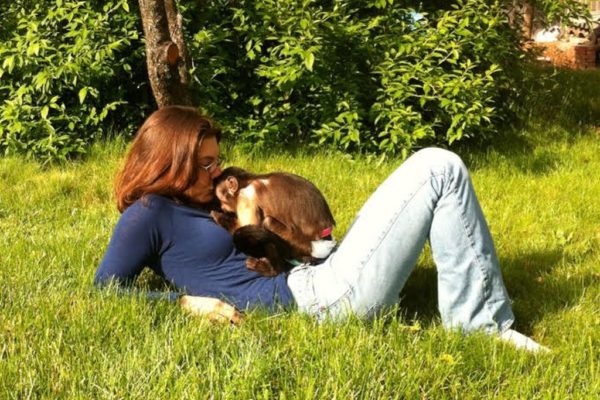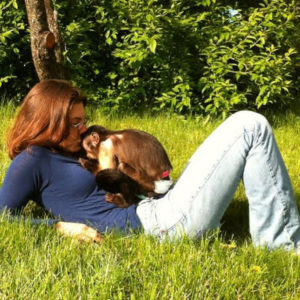I fostered a capuchin monkey for eight years, and loved every minute of it. But I knew it couldn’t last.

The Monkey Who Stole My Heart
By Lisa Brown | Photo by Adam Daredek | May 6, 2022 | CONNECTIONS | MAGAZINE
I never expected to become a mom . . . to a capuchin monkey.
We met at a nonprofit organization in Boston that trained monkeys to help people with disabilities. I’d been working there as a trainer and knew dozens of monkeys. But one of them stole my heart.
Simon.
I trained him for four years until he went off at age 14 to be the hands for someone who couldn’t use his own: a man who’d become quadriplegic. I was thrilled Simon could make a difference, after he’d been preparing for years. And yet, I was heartbroken, selfishly having fallen in love with a being intended for another.
Unfortunately, the pairing didn’t last. Simon was returned six months later.
I offered to become Simon’s foster parent. I was then a grad student, and he would join me, my husband, Adam, and our cat to create a unique family. From that moment on, we lived a life that felt like a sitcom.
One night I was reading in bed and noticed Simon was no longer beside me. I found him sitting on the kitchen floor. He’d stolen a beer from the refrigerator and was holding the bottle in his feet while trying to twist off the cap with his hands. I took it away and gave the little lush some water instead. Another time, he got into a box of Cheerios. When I caught him in the act, clutching Cheerios with his hands and feet, cereal bits flying out of his mouth, he whined in equal parts joy and guilt.
During my favorite moments, Simon would curl in a tiny ball on my chest and lean his cheek toward me, waiting for a kiss. He’d hold perfectly still and almost stop breathing. I’d give him one kiss, and then another. When I paused, he’d move his head closer to me and wait. So I’d kiss him again. We’d do this endlessly, and I loved it.
Simon had lived with us for five adventuresome, complicated, mischievous years when my husband and I had a baby. During Sebastian’s infancy, I kept Simon away from him. But as Sebastian grew into toddlerhood, I allowed some supervised visits. I watched as my human child began mimicking Simon’s behaviors, smacking his lips together to display love and affection, as monkeys do. One time, I discovered my toddler surreptitiously slipping his beloved Goldfish crackers to Simon — an expression of true sibling love.
But as my obligations increased and I had less time and energy to give, our idyllic life began falling apart. Two parents working full time. Two tiny beings needing endless love and attention. And one mom, fraying at the seams, feeling like I would need to make an unbearable choice.
In the end, Simon made the decision for me. He started demonstrating signs of stress: subtle changes in body language, vocalizations, and behavior. After eight years with us, he wanted something different. He needed it.
As a parent, you know you eventually must let go of your child. It’ll be a moment of pain — and pride. It comes too soon. It’s not soon enough. You want it to happen. You wish it wouldn’t. When I said goodbye to Simon, I gave away part of myself.
Simon turns 30 this month. He’s living out his golden years at Helping Hands: Monkey Helpers (capuchins live 35 to 40 years in captivity). The training facility has become a living center for aging, post-service monkeys like Simon, who are coping with maladies that also affect elderly humans — fatigue, diabetes, arthritis.
I get to visit Simon, and Helping Hands recently sent me pictures of him lounging in sunbeams and joyfully hanging upside down in the monkey play space, wrestling with his capuchin buddies Albert and Sadie. Like every parent, I only want what’s best for him. And like every parent, I learned I had to let him go to give him that.
Lisa Brown lives in Arlington and is writing a memoir about life with Simon. She is a board member of Helping Hands: Monkey Helpers.


